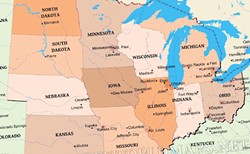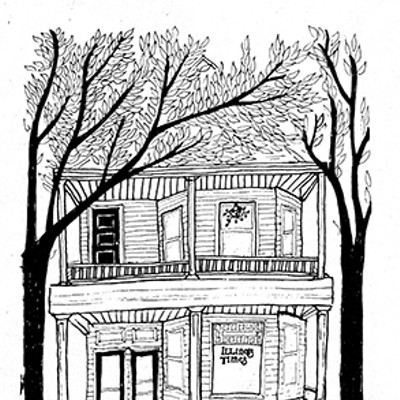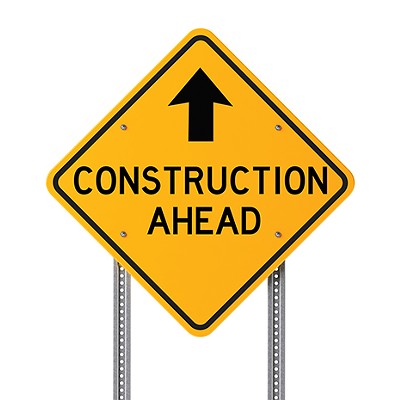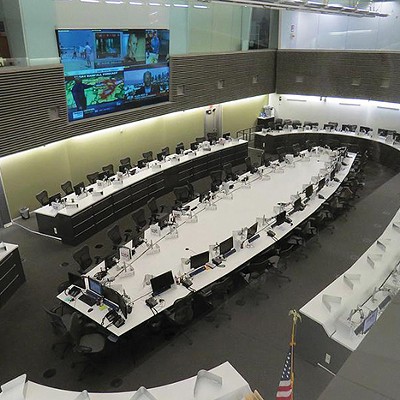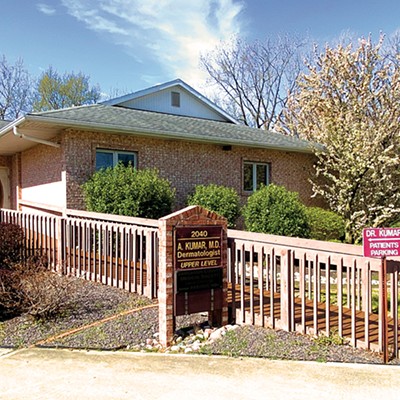Where is Illinois?
Finding ourselves gets harder all the time
[
{
"name": "Air - MedRect Combo - Inline Content 1",
"component": "11490391",
"insertPoint": "3",
"requiredCountToDisplay": "1",
"parentWrapperClass": "fdn-ads-inline-content-block"
},{
"name": "Air - MedRect Combo - Inline Content 2",
"component": "11490392",
"insertPoint": "7",
"requiredCountToDisplay": "5",
"parentWrapperClass": "fdn-ads-inline-content-block"
},{
"name": "Air - MedRect Combo - Inline Content 3",
"component": "11490393",
"insertPoint": "12",
"requiredCountToDisplay": "9",
"parentWrapperClass": "fdn-ads-inline-content-block"
}
]
You would think that the one inarguable fact about Illinois is that it is a Midwestern place. Walt Hickey, a writer for Nate Silver’s FiveThirtyEight, commissioned a web poll of self-identified Midwesterners that asked them which states they believed make up that region. He figured they’d know, but 19 percent of the nearly 1,400 people who replied thought Illinois is not in the Midwest. Apparently, most of the respondents believed that the Midwest consisted of their state and the states that abut it.
There is no official definition of Midwest. Well, actually there is – the Census Bureau has an official Midwest that includes Illinois and 11 other states – but lots of people think that this official Midwest is no more valid than official secrets, since it includes what are usually called the Plains states. Americans don’t bother with official maps in any event. The maps they use comprise vernacular regions, fashioned from what the great geographer Wilbur Zelinsky called “the shared, spontaneous image[s] of territorial reality, local or not so local, hovering in the minds of the untutored.”
Untutored. He meant us. The mental maps that Americans make of the places they know resemble the actual map as much as the State of Illinois budget described in campaign speeches resembles an auditor’s report. In the America as imagined by Americans, Illinois is smack in the middle of the continent, not in its eastern third and – judging from the many times New York editors called me in my Portland, Oregon, studio at 6 in the morning – Oregon is not on the West Coast.
As for the other states – not many know where they are. In 2006 the National Geographic Education Foundation commissioned a poll to gauge the nation’s “geographic literacy.” The results dismayed many educators, although they delighted British newspaper editors who love to cite evidence our bumpkin-ness. One in 10 Americans aged 18 to 24 with a high school education or less couldn’t locate the United States on a map of the world. Only a third knew where Iraq is and only a quarter could locate Iran. You’d think that people so eager to go to war might be interested enough to find out where the war is, but the descendants of the people who found Illinois using a canoe can’t find Iran using a computer.
True, that isn’t information you need, exactly. Knowledge of their own country would seem to matter more. But only one in five could point to seven test states – California, Texas, Louisiana, Nevada, Mississippi, New York and Ohio – on a map outlining state borders. Shame – or maybe not. I know I wouldn’t place Texas, Louisiana, Nevada, Mississippi anywhere in this country.
And Illinois? Asked to place Ohio on a map, seven percent put it in Illinois. I’d like to think that result showed a keen historical consciousness – in the 19th century, tens of thousands of Ohioan migrants put themselves in Illinois – but I don’t.
Place is not a matter of geography, but shared experience and cultural affinities. (It’s Iran’s history and culture that taxpayers and voters need to understand, not its map coordinates.) The borders that define us are age and education, not lines on a map. Illinois is a place where most people feel like Illinoisans. Illinoisans of all regions and eras have tended to share certain collective traits, a cultural family resemblance that describe Illinoisans even if they do not, by themselves, define them.
Contact James Krohe Jr. at [email protected].
There is no official definition of Midwest. Well, actually there is – the Census Bureau has an official Midwest that includes Illinois and 11 other states – but lots of people think that this official Midwest is no more valid than official secrets, since it includes what are usually called the Plains states. Americans don’t bother with official maps in any event. The maps they use comprise vernacular regions, fashioned from what the great geographer Wilbur Zelinsky called “the shared, spontaneous image[s] of territorial reality, local or not so local, hovering in the minds of the untutored.”
Untutored. He meant us. The mental maps that Americans make of the places they know resemble the actual map as much as the State of Illinois budget described in campaign speeches resembles an auditor’s report. In the America as imagined by Americans, Illinois is smack in the middle of the continent, not in its eastern third and – judging from the many times New York editors called me in my Portland, Oregon, studio at 6 in the morning – Oregon is not on the West Coast.
As for the other states – not many know where they are. In 2006 the National Geographic Education Foundation commissioned a poll to gauge the nation’s “geographic literacy.” The results dismayed many educators, although they delighted British newspaper editors who love to cite evidence our bumpkin-ness. One in 10 Americans aged 18 to 24 with a high school education or less couldn’t locate the United States on a map of the world. Only a third knew where Iraq is and only a quarter could locate Iran. You’d think that people so eager to go to war might be interested enough to find out where the war is, but the descendants of the people who found Illinois using a canoe can’t find Iran using a computer.
True, that isn’t information you need, exactly. Knowledge of their own country would seem to matter more. But only one in five could point to seven test states – California, Texas, Louisiana, Nevada, Mississippi, New York and Ohio – on a map outlining state borders. Shame – or maybe not. I know I wouldn’t place Texas, Louisiana, Nevada, Mississippi anywhere in this country.
And Illinois? Asked to place Ohio on a map, seven percent put it in Illinois. I’d like to think that result showed a keen historical consciousness – in the 19th century, tens of thousands of Ohioan migrants put themselves in Illinois – but I don’t.
Place is not a matter of geography, but shared experience and cultural affinities. (It’s Iran’s history and culture that taxpayers and voters need to understand, not its map coordinates.) The borders that define us are age and education, not lines on a map. Illinois is a place where most people feel like Illinoisans. Illinoisans of all regions and eras have tended to share certain collective traits, a cultural family resemblance that describe Illinoisans even if they do not, by themselves, define them.
Contact James Krohe Jr. at [email protected].
Illinois Times has provided readers with independent journalism for almost 50 years, from news and politics to arts and culture.
Your support will help cover the costs of editorial content published each week. Without local news organizations, we would be less informed about the issues that affect our community..
Got something to say?
Send a letter to the editor and we'll publish your feedback in print!

